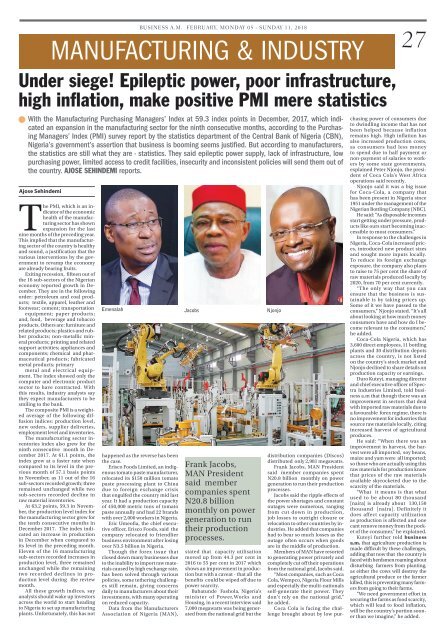Create successful ePaper yourself
Turn your PDF publications into a flip-book with our unique Google optimized e-Paper software.
BUSINESS A.M. FEBRUARY, MONDAY <strong>05</strong> - SUNDAY 11, 20<strong>18</strong><br />
MANUFACTURING & INDUSTRY<br />
27<br />
Under siege! Epileptic power, poor infrastructure,<br />
high inflation, make positive PMI mere statistics<br />
With the Manufacturing Purchasing Managers’ Index at 59.3 index points in December, 2017, which indicated<br />
an expansion in the manufacturing sector for the ninth consecutive months, according to the Purchasing<br />
Managers’ Index (PMI) survey report by the statistics department of the Central Bank of Nigeria (CBN),<br />
Nigeria’s government’s assertion that business is booming seems justified. But according to manufacturers,<br />
the statistics are still what they are - statistics. They said epileptic power supply, lack of infrastructure, low<br />
purchasing power, limited access to credit facilities, insecurity and inconsistent policies will send them out of<br />
the country. AJOSE SEHINDEMI reports.<br />
Ajose Sehindemi<br />
The PMI, which is an indicator<br />
of the economic<br />
health of the manufacturing<br />
sector has shown<br />
expansion for the last<br />
nine months of the preceding year.<br />
This implied that the manufacturing<br />
sector of the country is healthy<br />
and sound, a justification that the<br />
various interventions by the government<br />
to revamp the economy<br />
are already bearing fruits.<br />
Exiting recession, fifteen out of<br />
the 16 sub-sectors of the Nigerian<br />
economy reported growth in December.<br />
They are in the following<br />
order: petroleum and coal products;<br />
textile, apparel, leather and<br />
footwear; cement; transportation<br />
equipment; paper products;<br />
and, food, beverage and tobacco<br />
products. Others are: furniture and<br />
related products; plastics and rubber<br />
products; non-metallic mineral<br />
products; printing and related<br />
support activities; appliances and<br />
components; chemical and pharmaceutical<br />
products; fabricated<br />
metal products; primary<br />
metal and electrical equipment.<br />
The index showed only the<br />
computer and electronic product<br />
sector to have contracted. With<br />
this results, industry analysts say<br />
they expect manufacturers to be<br />
smiling to the bank.<br />
The composite PMI is a weighted<br />
average of the following diffusion<br />
indices: production level,<br />
new orders, supplier deliveries,<br />
employment level and inventories.<br />
The manufacturing sector inventories<br />
index also grew for the<br />
ninth consecutive month in December<br />
2017. At 61.1 points, the<br />
index grew at a faster rate when<br />
compared to its level in the previous<br />
month of 57.1 basis points<br />
in November, as 11 out of the 16<br />
sub-sectors recorded growth; three<br />
remained unchanged while two<br />
sub-sectors recorded decline in<br />
raw material inventories.<br />
At 63.2 points, 59.3 in November,<br />
the production level index for<br />
the manufacturing sector grew for<br />
the tenth consecutive months in<br />
December 2017. The index indicated<br />
an increase in production<br />
in December when compared to<br />
its level in the preceding month.<br />
Eleven of the 16 manufacturing<br />
sub-sectors recorded increases in<br />
production level, three remained<br />
unchanged while the remaining<br />
two recorded declines in production<br />
level during the review<br />
month.<br />
All these growth indices, say<br />
analysts should wake up investors<br />
across the world to start heading<br />
to Nigeria to set up manufacturing<br />
plants. Unfortunately, this has not<br />
Emenalah Jacobs Njonjo<br />
happened as the reverse has been<br />
the case.<br />
Erisco Foods Limited, an indigenous<br />
tomato paste manufacturer,<br />
relocated its $150 million tomato<br />
paste processing plant to China<br />
due to foreign exchange crisis<br />
that engulfed the country mid last<br />
year. It had a production capacity<br />
of 450,000 metric tons of tomato<br />
paste annually and had 22 brands<br />
with over 2,000 workers in Nigeria.<br />
Eric Umeofia, the chief executive<br />
officer, Erisco Foods, said the<br />
company relocated to friendlier<br />
business environment after losing<br />
over N3.5 billion in Nigeria.<br />
Though the forex issue that<br />
closed down many businesses due<br />
to the inability to import raw materials<br />
caused by high exchange rate,<br />
has been solved through various<br />
policies, some tethering challenges<br />
still remain, giving concerns<br />
daily to manufacturers about their<br />
investments, with many operating<br />
on reduced capacity.<br />
Data from the Manufacturers<br />
Association of Nigeria (MAN),<br />
Frank Jacobs,<br />
MAN President<br />
said member<br />
companies spent<br />
N20.8 billion<br />
monthly on power<br />
generation to run<br />
their production<br />
processes.<br />
stated that capacity utilisation<br />
moved up from 44.3 per cent in<br />
2016 to 55 per cent in 2017 which<br />
shows an improvement in production<br />
but with a caveat - that all the<br />
benefits could be wiped off due to<br />
power scarcity.<br />
Babatunde Fashola, Nigeria’s<br />
minister of Power,Works and<br />
Housing, in a recent interview said<br />
7,000 megawatts was being generated<br />
from the national grid but the<br />
distribution companies (Discos)<br />
distributed only 2,981 megawatts.<br />
Frank Jacobs, MAN President<br />
said member companies spent<br />
N20.8 billion monthly on power<br />
generation to run their production<br />
processes.<br />
Jacobs said the ripple effects of<br />
the power shortages and constant<br />
outages were numerous, ranging<br />
from cut down in production,<br />
job losses to outright closure or<br />
relocation to other countries by industries.<br />
He added that companies<br />
had to bear so much losses as the<br />
outage often occurs when goods<br />
are in the middle of production.<br />
Members of MAN have resorted<br />
to generating power privately and<br />
completely cut off their operations<br />
from the national grid, Jacobs said.<br />
“Most companies, such as Coca<br />
Cola, Wempco, Nigeria Flour Mills<br />
and especially the multi-nationals<br />
self-generate their power. They<br />
don’t rely on the national grid,”<br />
he added.<br />
Coca Cola is facing the challenge<br />
brought about by low purchasing<br />
power of consumers due<br />
to dwindling income that has not<br />
been helped because inflation<br />
remains high. High inflation has<br />
also increased production costs,<br />
as consumers had less money<br />
to spend due to half payment or<br />
non-payment of salaries to workers<br />
by some state governments,<br />
explained Peter Njonjo, the president<br />
of Coca Cola’s West Africa<br />
operations said recently.<br />
Njonjo said it was a big issue<br />
for Coca-Cola, a company that<br />
has been present in Nigeria since<br />
1951 under the management of the<br />
Nigerian Bottling Company (NBC).<br />
He said: “As disposable incomes<br />
start getting under pressure, products<br />
like ours start becoming inaccessible<br />
to most consumers.”<br />
In response to the challenges in<br />
Nigeria, Coca-Cola increased prices,<br />
introduced new product sizes<br />
and sought more inputs locally.<br />
To reduce its foreign exchange<br />
exposure, the company also plans<br />
to raise to 75 per cent the share of<br />
raw materials produced locally by<br />
2<strong>02</strong>0, from 70 per cent currently.<br />
“The only way that you can<br />
ensure that the business is sustainable<br />
is by taking prices up.<br />
Some of it we have passed to the<br />
consumers,” Njonjo stated. “It’s all<br />
about looking at how much money<br />
consumers have and how do I become<br />
relevant to the consumers,”<br />
he added.<br />
Coca-Cola Nigeria, which has<br />
3,600 direct employees, 11 bottling<br />
plants and 30 distribution depots<br />
across the country, is not listed<br />
on the country’s stock market and<br />
Njonjo declined to share details on<br />
production capacity or earnings.<br />
Duro Kuteyi, managing director<br />
and chief executive officer of Spectra<br />
Industries Limited, told business<br />
a.m that though there was an<br />
improvement in sectors that deal<br />
with imported raw materials due to<br />
a favourable forex regime, there is<br />
no improvement for industries that<br />
source raw materials locally, citing<br />
increased harvest of agricultural<br />
produces.<br />
He said: “When there was an<br />
improvement in harvest, the harvest<br />
were all imported, soy beans,<br />
maize and yam were all imported;<br />
so those who are actually using this<br />
raw materials for production know<br />
that prices of the raw materials<br />
available skyrocketed due to the<br />
scarcity of the materials.<br />
“What it means is that what<br />
used to be about 80 thousand<br />
[naira] is already about 130,150<br />
thousand [naira]. Definitely it<br />
does affect capacity utilization<br />
as production is affected and one<br />
cant remove money from the pocket<br />
of the consumer,” he explained.<br />
Kuteyi further told business<br />
a.m. that agriculture production is<br />
made difficult by these challenges,<br />
adding that now that the country is<br />
faced with herdsmen roaming about<br />
disturbing farmers from planting,<br />
as either the cows will destroy the<br />
agricultural produce or the farmer<br />
killed, this is preventing many farmers<br />
from going to their farms.<br />
“We need government effort in<br />
securing the farms as food scarcity,<br />
which will lead to food inflation,<br />
will be the country’s portion sooner<br />
than we imagine,” he added.










